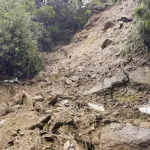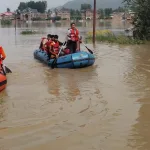Srinagar, March 16: The Karewa land in Kashmir, the fertile and ancient soils of Kashmir’s geological treasure have been affected over the years due to the construction of infrastructure, illegal excavation and are under constant threat.
The Kashmiri name Karewa is applied to the more or less flat terrace or tablelands which cover a great part of the valley, especially on the left bank of the river Jhelum.
Waseem Ahmad, a resident of Budgam said over the years there has been a decline in the Karewa land as the district has many brick kilns. He said the soil which is material is used for making brick is taken from these karewas.
“Brick kilns are already polluting the environment and these also have caused a lot of damage to the karewa land. In future the agriculture land would face further damage if the excavation continues like this,” he said.
The Karewa deposits have different soils and sediments such as sand, clay, silt, shale, mud, lignite, and waste. Hence, these are very useful for agricultural and horticultural activities.
Although the government has banned the exaction of soil in the karewa but it lacks implementation and people continue illegal excavation of the soil from the lands.
Iftikar Ahmad, a resident of Pulwama said the illegal exaction of soil continues to go unchecked in the area which is not only causing damaged to the karewa but also affects the agriculture activities.
“There are no checks on the illegal excavation of soil in these karewa and people do take soil during the night hours which must be stopped,” he said.
Iftikar, who is a farmer, said once the excavation of land happens, it is exposing the entire land patch on that particular area to grave risks of landslides.
When the 125-km-long Qazigund-Baramulla rail line was constructed massive portions of karewas in Pulwama, Budgam and Baramulla districts were razed to the ground for clay.
“When land were razed to the ground for clay, then also people were silent but today we are seeing the impact as these have been further damaged,” said Tajamul, a resident of Delina, Baramulla.
“Even today the karewa are dotted with deep and huge pits where from the clay was taken. When it rains in spring landslides happen and these damage apple orchards,” he said.
Experts said the karewa are an important ecological and geological feature of the Kashmir valley, formed over millions of years by sedimentation and erosion when the valley large lake transformed into Kashmir valley.
Rayees Ahmad Shah, Project Associate at the Department of Geoinformatics, University of Kashmir said the karewas were once important for the landscape beauty and these karewas were a record of past of the climate changes that have happened in Kashmir.
He said rapid urbanization and infrastructural development in the region has led to the destruction of the karewas. The excavation and levelling of the karewas have also caused soil erosion leading to landslides and other environmental problems.
“Many people took the soil as a material for land filling and for construction purpose and many structures were raised in the land. Due to the excavation over the years it has affected the karewa,” he said.
Rayees called the karewas a book or an archive of information. “But over the years, these have been damaged affecting plant and animal life which used to be there,” he said.
“Karewa was the natural topography in Kashmir but it is being damaged and pollution and particulate matter is also increasing which affect vegetation. We are losing an archive source. It was a geological heritage and it is under threat,” he said.
Apart from agriculture, karewa region also supports small-scale industries such as handicrafts, pottery etc. which are part Kashmir culture for centuries and provide employment opportunities for thousands of people.
Notably, Kashmir saffron, which received a Geographical Indication (GI) tag in 2020 for its uniqueness and high aroma, bitter flavour, is grown on these karewas.
Tahir Ahmad, Agriculture Extension Assistant Agriculture Department Kashmir said the karewa land in Kashmir once added beauty to the landscape have shrunk and it has largely affected the natural beauty.
“When the top layer of the soil is damaged and soil erosion happens it affects the fertility of the land and ultimately affecting agriculture. These karewa were also natural habitat for plants and animals and human activities have put an effect on the biodiversity,” he said.
“The karewa were unique in Kashmir but these have been damaged due to infrastructural development like construction of roads, buildings and other structures,” he said.
Tahir said the pollution has also got increased while the plantation has been decreased due to urbanization and construction of houses, roads and shopping complexes.
Karewa: Kashmir’s geological treasure under threat
Leave a Comment Leave a Comment





